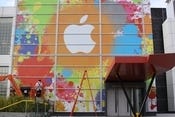Apple iPad Arrives Amid ControversyApple iPad Arrives Amid Controversy
Skeptics dismiss the iPad as underwhelming and limiting while developers see dollar signs.


Apple iPad Launch in Pictures
(click image for larger view)
Apple iPad Launch in Pictures
It will be a few months before the market renders a meaningful judgment on the success or failure of Apple's forthcoming iPad.
But Internet scribes have weighed in along predictable lines.
Peter Brown, executive director of the Free Software Foundation, has lambasted the device as a threat to freedom, a gripe leveled frequently about the iPod and iPhone, not to mention Microsoft, over the years.
Bemoaning the iPad's lack of camera and phone, and its software regulation, Tim Bray, Sun's director of Web technologies, declares, "For creative people, this device is nothing."
Twitter engineer Alex Payne dismisses the iPad as "a deeply cynical thing. It is a digital consumption machine."
Competitors like Nintendo president Satoru Iwata have damned the iPad with faint praise, noting there was nothing surprising about it.
Flash marketing manager Adrian Ludwig complains about Apple's lack of support for Flash. "It looks like Apple is continuing to impose restrictions on [its] devices that limit both content publishers and consumers," he said.
And Internet users -- women in particular -- have ridiculed the name "iPad" and enumerated the iPad's list of supposed failings across thousands of Web sites. Some of the YouTube parodies are pretty funny.
Apple's defenders have answers. Responding to complaints about the iPad's threat to technological freedom, Daring Fireball's John Gruber asserts that Apple is taking computing to a place where low-level access is no longer the norm, the way that car makers have largely done away with manual gear shifting.
"Manual computers, like the Mac and Windows PCs, will slowly shift from the standard to the niche, something of interest only to experts and enthusiasts and developers," he says.
The problem with comparing cars to computing devices is that a tool for transportation isn't inherently political. A tool for content consumption and creation, however, is inherently political.
While both cars and computing devices may be regulated for "safety," the safety measures employed by car makers to protect drivers from harmful impact cannot really be compared to the safety measures employed by Apple to protect users from content that Apple doesn't approve of.
Although Gruber likely is correct that many forms of computing will be managed experiences in the future, device oversight need not be paternalistic, patronizing, or capricious.
For many developers, revenue potential appears to be what matters. iPhone developer Nick Dalton predicts Apple will sell a lot of iPads and says he, like Apple's Scott Forstall, believes another gold rush is at hand.
Veteran Apple developer Jeff LaMarche takes a line similar to Gruber's by dismissing the iPad's lack of openness. "I'm a techie, but I don't need to be able to program on every electronic device I own," he states. "I don't hate my dishwasher because I can't get to the command line. I don't hate my DVD player because it runs a proprietary operating system."
Yet even as he tells iPad haters that, "it's not always about you," LaMarche makes his acceptance of the iPad about him. He might come to hate his DVD player if its regional encoding system prevented him from watching certain movies. And even if not, citing his disinterest in openness doesn't really address whether the complaints have merit.
But LaMarche does make a point not heard enough in the debate about the iPad: That it is an appliance and not a personal computer in the traditional sense. Complaining that the iPad is a sub-par computer is a bit like lamenting that one's hat makes a poor umbrella.
The short summary of the iPad is that it's not for everyone.
Though it's supposedly a "revolutionary" device, it's far less revolutionary than the iPhone, which put a Web-capable computer into the pockets of millions.
At the same time, not every device needs to overturn the old order. The first iPod wasn't nearly as good as the iPod touch has become. If Apple's iPad doesn't meet your needs, you can be sure that Google, Microsoft, and a whole host of PC makers and consumer electronic companies will try to do better.
It may turn out, however, that criticizing the iPad ends up being considerably easier than engineering, manufacturing, and marketing a superior alternative.
About the Author
You May Also Like






